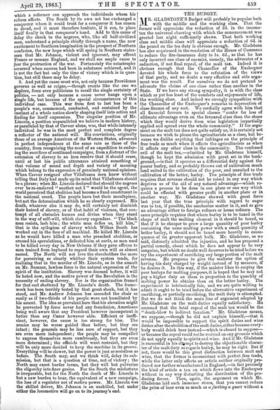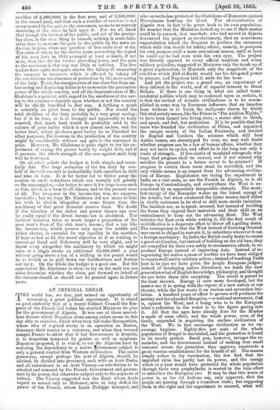TilE BUDGET.
MR. GLADSTONE'S Budget will probably be popular both with the middle and the working class. That the former will appreciate the reduction of 2d. in the income- tax the universal cheering with which the announcement was greeted last night sufficiently shows. That both working class and middle class will appreciate a reduction of 6d. in the pound on the tea duty is obvious enough. Mr. Gladstone has also acquiesced in the resolution of the House of Commons to reduce the fire-insurance duty to is. 6d., so that he has only incurred one class of enemies, namely, the advocates of a reduction, if not final repeal, of the malt tax. Indeed it is obvious enough that the Chancellor of the Exchequer devoted his whole force to the refutation of the views of that party, and no doubt a very effective and able argu- ment was the result. For ourselves we do not pretend to advocate the claims of one class rather than another in the State. If we have any strong sympathy, it is with the class which as yet has least of the comforts and enjoyments of life, the working class. And indeed we strongly sympathize with the Chancellor of the Exchequer's remarks in deprecation of class-finance of any sort. We cordially agree with him that all financial favours to special classes "confer far less of ultimate advantage even on the favoured class than the share which they would derive from wise legislation impartially applied and spread over the whole community." If his argu- ment on the malt tax does not quite satisfy us, it is certainly not because we wish to please the agriculturists as a class, but be- cause we dislike anything that infringes on the principle of free trade as much when it affects the agriculturists as when it affects any other class in the community. The confessed evil of the malt tax,—admitted by Mr. Gladstone himself, though he kept the admission with great art in the back- ground,—is that it operates as a differential duty against the poorer barley, and so probably throws out of cultivation much land suited to the cultivation of the poor, and unsuited to the cultivation of the better, barley. The principle of free trade requires that revenue should not be raised in any way which deprives us of the aid of any natural advantage—which re- quires a process to be done in one place or one way which could be effected with greater profit in another place or in another way. Mr. Gladstone showed with great force last year that the true principle with regard to sugar was to tax, if possible, the saccharine matter in it, and so give no advantage either to foreign refiners or home refiners. The same principle requires that where barley is to be taxed in the shape of malt the malting element in it should be taxed, so that if it be cheaper to grow a large quantity of poor barley containing the same malting power with a small quantity of better barley, it should not be taxed more heavily in conse- quence of its greater apparent bulk. Mr. Gladstone, as we said, distinctly admitted the injustice, and he has proposed a partial remedy, about which he does not appear to be very sanguine, but which no doubt well deserves to be tried before we try the experiment of sacrificing any large portion of the malt revenue. He proposes to give the maltater the option of having his duty charged by weight instead of by measure, if he desires it. In this way, if the malster likes to employ the poor barleys for malting purposes, it is-hoped that he may not pay a higher duty on them in proportion to the quantity of malting power he obtains than on the better barley. The experiment is intrinsically fair, and we are quite willing to admit it ought to be tried before the alternative experiment of sacrificing, or partially sacrificing, the malt duty is attempted. But we do not think the main line of argument adopted by Mr. Gladstone on the malt duties equally satisfactory. He assumed that the total repeal of the malt tax would be the "death-blow to indirect taxation." Mr. Gladstone means, we suppose,—though he did not explain himself,—that it would be impossible to support the spirit duties and wine duties after the abolition of the malt duties, either because every- body would drink beer instead—which is absurd to suppose— or because the repeal could notbe resisted on any grounds which do not apply equally to spirits and wine. And if Mr. Gladstone is successful in his attempt to destroy the objectionable charac- ter of the malt duty as regards barley, he may be right. But if not, there would be this great distinction between malt and wine, that the former is inconsistent with perfect free trade, while the latter only affects an article neither originally pro- duced nor further manufactured in England,—in fact precisely the kind of article a tax on which flows into the Exchequer without in any way disturbing the distribution of the pro- ducing forces. Then, again, the argument on which Mr. Gladstone laid such immense stress, that you cannot reduce the price of beer even so much as a farthing a quart without a sacrifice of 2,480,0001. in the first year, and of 3,360,0001. in the second year, and that such a sacrifice of revenue is not compensated by the gain to the consumers, seems to us scarcely deserving of the stress he laid upon it. For we all know that though the interest of the public, and not of the produc- ing class, is the true thing to consult, nothing is more.falla- cious than to measure the gain to the public by the mere re- daction in price when any question of free trade is at st The price of wheat for the twelve years succeeding the repeal Of the coin laws in 1846 averaged at least as much, if not more, than that for the twelve preceding years, and the gain to the consumer in that way was little or nothing. The free traders have again and again shown the fallacy of measuring the economy in resources which is effected by taking off the mischievous interferences of protection by the mere saving of the duty. To set the energies even of one class free from em- barrassing and displacing duties is to economize the productive power of the whole country, and all the impressiveness of Mr. (Hadstone's argument with regard to the smallness of the sav- ing to the consumer depends upon whether or not the country will be chiefly benefited in that way. A farthing a quart is certainly no great boon to the public. Nor would the total abolition of the duty probably be a very great saving ; but if it be true, as is so strongly and apparently so truly asserted, that much land would be profitably used in the culture of poor barley which is now almost useless, and the better land, which produces good barley be so liberated for other purposes, the increase in the production of the country might be considerable without any gain to the consumer in price. However, Mr. Gladstone is quite right to try his ex- periment of taxing the poorer barley by weight first, and if it answers, the whole strength of the case against malt duty will be destroyed.
On all other points the budget is both simple and essen- tially fair. The large reduction of the tea duty by one- half of its total amount is undoubtedly both excellent in drift and wise in form. It is far better not to fritter away the surplus in small redactions which can scarcely tell greatly on the consumption,—far better to save it for large boons such as this, which is a boon to all classes, and to the poorest most of all. The twopence in the income-tax was, we suppose, inevitable ; but we hope Mr. Gladstone did not mean to hint his wish to abolish altogether at some future time the inachiuery of that great financial reserve fund. We doubt if the taxation of the richer and poorer classes can ever be really equal if the direct income-tax is abolished. The indirect taxation takes so much larger a proportion of the poor man's than of the rich man's income, that a tax like the income-tax, which presses only upon the middle and richer classes, is essential for any equality in the sacrifice. If kept as low as 4d. the moral objection to it as tending to encourage fraud and dishonesty will be very slight, and to throw away altogether the machinery by which we might raise at a single stroke an additional 10,000,000/. a year without going above a tax of a shilling in the pound would be as foolish as to pull down our fortifications and destroy our navy. On the whole the budget is a good one. But the experiment Mr. Gladstone is about to try on the malt tax can alone determine whether the claim put forward on behalf of tho farmers should or should not be pressed again in future years.































 Previous page
Previous page